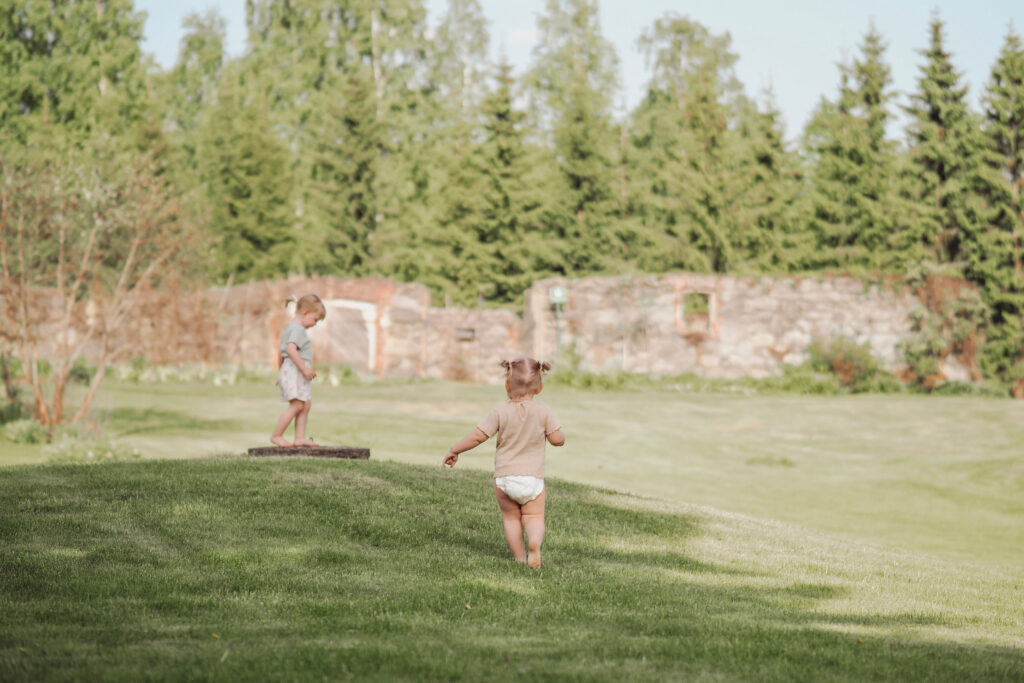The move to daycare is a major milestone for both the child and the parents. This new chapter can evoke a range of emotions: excitement, anticipation and maybe even a little worry. A successful start to daycare lays a solid foundation for your child’s early education and social development. In this article, we share our best tips and advice to help you ensure that the transition is as comfortable as possible for both you and your child. Read on to find out how you can support your child in this new adventure and make starting daycare a joyful experience for all involved.
1. Preparing is half the battle: How to prepare for starting daycare together
Starting daycare is a big step for both child and parents, and good preparation can make the transition smoother. Spend time talking with your child about what’s happening at daycare. You can read books about life in the daycare center and play with situations related to the daycare center. Involving your child in preparations, such as choosing new clothes or accessories, can help them become more enthusiastic and adapt. Getting to know the routines and timetables of the daycare centre also helps children to adapt to the new environment in advance. Go over any allergies and health issues with staff so that all the necessary information is in place. Getting ready together reduces uncertainty and gives your child a sense of security knowing what to expect.
Here are some tips on what to pack for daycare!
Spend time talking to your child about what is happening at the daycare centre.
2. Know the routines of the daycare centre: What do the children do during the day?
Understanding the routines of the daycare centre will help you to adapt to your new daily routine. In most daycares, the day starts with a communal morning circle, followed by a morning of free play, guided activities and outdoor play. After lunch, there is a rest period, followed by an afternoon of play, outdoor activities and possibly a guided activity before going home. These routines help your child to anticipate the day and give them a sense of security. For parents, knowing the structure of the day allows them to talk to the child and better understand their experiences.
Read our tips on dressing your baby here!
3. Introductory days help with the excitement: How to make the first few days of getting to know the place go smoothly
The first days of getting to know the daycare centre are crucial, as they help to ease the tension for both the child and the parents. Introductory visits give the child the opportunity to get to know the new environment, toy storage, playmates and carers. Parents can be present, which gives the child encouragement. It is important that the introductions are stress-free: give the child time to explore at their own pace without rushing. This will make the child feel that the daycare centre is a safe place and the transition will go more smoothly. This is also a good time for parents to talk to the staff and get answers to any questions they may have, which will increase their confidence in the centre.
4. Support for parents: How to deal with your own emotions when your child starts daycare?
When a child starts daycare, it is often an emotional time for parents. It’s only natural to experience worry, excitement and sadness when your child enters a new environment. It is important to allow yourself to deal with these feelings openly. Talk about your feelings with friends, your spouse or other parents: their experiences can be very comforting and encouraging. Trust the staff at the daycare centre and remember that your child is in the good care of professional carers. Good cooperation and communication with the daycare centre can also ease your mind. Remember that a little separation is part of your child’s growth and independence, and will help them develop adaptability and social skills. Don’t forget to take care of yourself too: make time for your own hobbies and relaxation to support your child in the best possible way.
Trust the daycare staff and remember that your child is in the good care of professional caregivers.
5. Communication is key: Cooperation with the daycare staff
Effective communication with daycare staff is crucial for a smooth daycare experience. Open interaction helps build trust and understanding on both sides. Set aside time to talk with caregivers and share information about your child’s needs, interests and concerns. This will enable caregivers to support your child’s well-being and development. Parents’ evenings and discussion groups offered by the daycare centre are a great opportunity to deepen cooperation and get to know other parents. Make use of communication channels such as email and other communication platforms. Even small things, such as positive feedback, can strengthen good cooperation and motivate staff. When children see the trust between their parents and carers, they also feel safer and have a positive experience of the daycare.

6. Cries and laughter: Recognise and deal with your child’s emotions
When a child starts at daycare, their feelings can vary greatly. It is important to recognise and deal with these emotions correctly. Your child may experience excitement, excitement, fear, uncertainty, joy – sometimes even all of these emotions on the same day. Crying in the morning at the moment of separation is perfectly normal. It is important for the parent to remain calm and empathetic, but at the same time consistent. Reassure your child that they are safe and that you will come and get them at the end of the day. Praise and encouragement for even small steps forward, such as making new friends, can help your child adjust. Communicate openly with your child about their day at daycare and listen to their feelings. Also discuss your child’s feelings and behaviour with the daycare staff. Openness and acceptance of feelings create a safe environment for the child’s growth and well-being.
7. Everyday routines bring security: How to create a morning routine that works
A good morning routine is an important part of a smooth day at daycare and provides security for both the child and the parents. It’s a good idea to start preparing the night before: choose the next day’s clothes together, pack a backpack and make sure everything you need is ready. This will help make the morning more relaxed. Wake up early enough to give your child time to wake up, eat breakfast and get ready for daycare without rushing. Clear routines provide predictability and security for your child, which will help them adjust to the rhythm of the day at daycare. You can make morning activities more enjoyable by singing, playing or spending a little time together to create a positive atmosphere for the whole day. Use encouraging words and hugs during morning activities to give your child courage and confidence for the day ahead. Parents’ calmness and consistency are key to communicating to the child that all is well.
Also check out our tips on feeding your baby to make getting ready for the start of daycare easier. See the tips here!
8. Goodbye to separation anxiety: Ways to make it easier to leave your child at daycare
Separation anxiety is a common challenge when starting daycare, but there are a few things you can do to make it easier for your child to start. Create a consistent and positive morning routine that provides your child with a sense of security. Set aside enough time each morning so that the time of departure doesn’t feel rushed. Saying goodbye can become easier if it happens in the same place and in the same way every day. For example, a short, positive goodbye, such as a hug, a kiss and the phrase “see you soon” can make things easier. Avoid lengthy goodbyes as they can prolong the separation. You can also give your child a small, comforting object to take with them, such as a soft toy or a photo of the family. Tell your child what to expect at daycare, such as fun games and new friends, which can reduce tension. For most children, separation anxiety decreases over time. Stay patient and trust that your child will learn to cope better with moments of separation over time.
Create a consistent and positive morning routine that gives your child a sense of security.
9. Continuous learning at home: How to support your child’s daycare activities at home
Support for a child’s kindergarten career continues at home, and parents play a key role in this. Ensure that there are regular routines at home that support the skills and habits learned at daycare. Shared moments, such as bedtime stories or quiet conversations about the day’s events, help to create a safe bond and provide an opportunity to process the child’s feelings and experiences. Games and play that stimulate creativity and social skills are also useful. Give your child the opportunity to practice independence, which is an important part of a day at daycare. For example, you can let your child help set the table. Consistency between mealtimes and bedtime supports your child’s energy levels and well-being. Discuss the events of the day in a positive tone, highlighting the fun moments and new things learned. Parental interest and support at home will increase your child’s confidence and willingness to participate actively in daycare life.
10. Assessment and flexibility: How to assess and adapt when your child starts daycare
After starting daycare, it is important to assess how the transition has gone and make changes if necessary. Talk to your child regularly about their experiences at daycare. Ask them what they have learned, what has been fun and what might have been exciting. Listening to your child’s feelings and experiences will help you understand how they are adjusting. Also have regular discussions with the daycare staff. Ask them for feedback and observations about your child’s day. This may reveal things you may not have noticed yourself. If you notice challenges, be prepared to make changes to routines or approaches. For example, an earlier bedtime or a change in morning routine can improve your child’s well-being. Remember that flexibility and patience are key – every child is an individual and adapts at their own pace.
With these tips and advice, you are sure to lay a good foundation for a successful and positive daycare journey!









